湘少版六年级英语上册:全册知识归纳【精品】
湘少版小学英语六年级复习知识点

湘少版小学英语六年级复习知识点文稿归稿存档编号:[KKUY-KKIO69-OTM243-OLUI129-G00I-FDQS58-湘少版(湖南少年儿童出版社出版)小学英语教材知识点,使用湘教版小学英语教材六年级(de)老师应该用得着,这些知识点还是很全面(de),希望对您有所帮助.1.字母:(大小)辨认、书写顺序;元音字母:A a , Ee, Ii, Oo, Uu2. 数字:1~999(de)基数词和序数词(de)运用,如计算、购物、时间、日期等.句型:①What's your number②What’s the time③How many pens are there④How old are you⑤How much is it⑥How tall are you⑦How heavy are you⑧What time do you get up⑨When's your birthday⑩What time did you see him3. 颜色:单词:red, pink, yellow, brown, blue, purple, orange, black, white, green.句型:①What colour is it②What’s your favourite colour4. 时间:年、季节、月、星期、日、时刻:Season( spring, summer, autumn, winter)Month: January, February, March, April, May, June, July, August, September, October, November, December.Week:Sunday, Monday, Tuesday, Wednesday, Thursday, Friday, Saturday.Day:1st May (the first of May), May 2nd ( May the second)句型:见话题2.5. 食品与饮料:人对食品与饮料(de)喜好;东西方食品.句型:①I like biscuits.②I’d like a cold drink.③Would you like some buns④Do you want some rice⑤This isn’t my food.6. 服装:服装(de)颜色:人对服装(de)喜好;某人(de)穿戴;所属关系;位置等.句型:①I like the green T-shirt.②Where’s my new cap③Who’s shirt is this④Is this your hat7.物品:名词(de)单、复数;特点、颜色、所属关系;存在(de)位置(in, on, under, beside, behind, in front of, above, near, inside, outside).玩具(toy car, doll, )文具(desk, book, bag ,pen, pencil, pencil-box, ruler, pencil sharpener,)句型:①What’s this②What colour is it③Whose is this④This is my brother’s painting.⑤I have a puppet.⑥There's a car near the hospital.⑦Was it in the wardrobe⑧Is there a book on the desk⑨That's not mine.8.动物和植物:cat, dog, duck, fish, sheep, bird, panda, monkey, rabbit, hen , cock, chick, tiger, lion, pig, cow , mouse (mice), elephant, ladybird, puppy, tree, flower, rose,9. 建筑与场所:factory, hospital, park, house, library, museum, office, farm, post office, bank, police station, railway station, bookstore, school, classroom, skating rink, café, house(ba throom, living-room, sitting-room, bedroom,kitchen),garden…10. 身体:head, hair, eye, nose, ear, mouth, neck, hand, finger, foot(feet) ,toe…外貌: fat, thin, tall, short, old, young, two big blue eyes, long hair, short hair, black hair. 句型:①This is my nose.②Touch your head.③Raise your arm.11. 个人情况:姓名、年龄、地址、特点与爱好.句型:①I'm twelve years old.②My hobby is reading.③I like music.④I'm interested in space.⑤My name is Peter.⑥I'm tall and thin.⑦Do you have any hobbies12. 家庭、亲属和朋友:姓名、年龄、地址、职业、特点与爱好、与你(de)关系family, grandfather(grandpa/granddad), grandmother(grandma/grand mum), father, mother, brother, sister, uncle, aunt, cousin, friend.句型:①Who's heHe's my father.②He's a doctor③He likes playing games.④My father helps me.⑤Is he a soldier⑥What’s he13. 学校:学校建筑和学校生活.school, classroom, library, playground, Chinese, maths , English, music, computer, PE, art, science,句型:①When do you go to school②What time do you have English14. 情绪和身体状态:happy, sad, tired, angry, shy, sorry, well, sick,句型:①I'm sick.②I'm happy.③We are sorry.④ I feel sad.15. 社交礼仪:礼貌用语;询问与应答.句型:问候①Hello./ Hi.②Good morning/afternoon/evening.③How are you ④How do you do⑤Glad to meet you./ Nice to meet you.介绍①My name is…②I’m a pupil.③I’m 12.④This is our teacher, Miss Chen.⑤He is from Japan.道别①Goodbye./Bye.②See you.③Good night.道谢①Thank you./Thanks.②You’re welcome.道歉①Sorry.②I’m sorry.③Excuse me.请求①Can I have a puppy ②Can I borrow a pencil ③Yes, please.④Of course.祝愿①Happy birthday.②Merry Christmas.提供帮助①Can I help you ②What can I do for you ③What’s the matter寻求帮助和建议①What can I do用餐①Do you want some soup ②Would you like some rice ③I'd like a cold drink.购物①Which one do you want ②Can I look at it ③I want a red one, please.④It's too expensive.⑤Have you got enough money⑥How much is it16.国家与国庆日:China, Japan, America (the USA), English( the UK), Australia, Russia, Canada, Singapore, India, France,句型:①When’s your country’s National Day②I come from China.17.天气与气候特征:hot, cold, cool, warm, sun, sunny, rain ,heavy rain, rainy, wind, strong wind,windy, snow , heavy snow, cloud, cloudy, …句型:①What's the weather like②It’s a cold day.③Spring is warm and nice.④Tomorrow will be rainy.⑤I like a sunny day.18. 节日:节日(de)特点;节日(de)活动.New Year's Day, Spring Festival, Children's Day, Mid-autumn Festival, Teachers' Day , National Day, Christmas Day, Dragon Boat Festival.19. 正在发生(de)事情:现在进行(de)动作和发生(de)事.句型:①Are you making a kite②Peter is writing.③What's Anne doing④Where are you going⑤What are they doing⑥Is he running20.日常生活:日常生活、工作、学习(de)活动.句型:①I come to school by bus.②Your homework is good.③What time do you get up④She always get up early.21. 计划与打算:计划和将要进行(de)动作be going to do …句型:①I’m/You’re /He’s/She’s /We’re/They’re (not) going to swim.②Are you going to swim③Is he/she going to visit Anne④What are you going to do⑤What is he going to do⑥When are they going to swim⑦Tomorrow will be rainy.⑧ I'll stay at home.22. 能力和可能:能做某事或可能进行某事.句型:①Can you read and write in English②Can I have a puppy③What can you do④She can run fast.23. 过去发生(de)事情或过去(de)打算:过去式.句型:①Where were you②Who was first③Was it in the wardrobe④Benny took my ball.⑤Where did you go⑥What did you do⑦I came by plane.⑧Anne wanted to skate.24. 对事物(de)比较:比较级和最高级.句型:①My singing is louder than yours.②I’m taller than you.③There more shops in Picture One.④Some stories are more interesting than others.⑤The most interesting stories.⑥Who is fatter25.提醒与告示:①What does that sign mean②Draw a cat on the roof.③Don't put your feet on the seat.④No speaking.⑤Do not go in.26.擅长和喜欢(de)事情:①I'm/ You're/ He's good at drawing.②I like playing basketball.。
湘少英语六年级上册知识提要

湘少英语六年级上册知识提要Unit 1: My School LifeThis unit introduces vocabulary related to school subjects, daily routines, and school facilities. Students will learn to express their preferences and describe their school life.Unit 2: My FamilyIn this unit, students will learn vocabulary related to family members and possessive pronouns. They will be able to describe their family members and their roles in the family.Unit 3: My HomeThe focus of this unit is on vocabulary related to rooms and furniture in a house. Students will learn to describe their home and talk about different activities they do at home.Unit 4: My HobbiesThis unit introduces vocabulary related to hobbies and leisure activities. Students will be able to express their interests and talk about what they like to do in their free time.Unit 5: My CityIn this unit, students will learn vocabulary related to places in a city and directions. They will be able to give and follow directions, as well as describe their city and the different activities available.Unit 6: My Daily RoutineThe focus of this unit is on vocabulary related to daily routines and time. Students will learn to talk about their daily activities and ask and answer questions about daily routines.Unit 7: My PetsThis unit introduces vocabulary related to different types of pets and their characteristics. Students will be able to describe their pets and talk about their preferences regarding pets.Unit 8: My Travel ExperienceIn this unit, students will learn vocabulary related to travel and transportation. They will be able to talk about their travel experiences, including destinations, means of transportation, and activities during the trip.Unit 9: My Future PlansThe focus of this unit is on vocabulary related to future plans and aspirations. Students will learn to talk about their dreams, goals, and future plans, as well as express their opinions and preferences about future careers.Unit 10: My MemoriesIn this unit, students will learn vocabulary related to past events and memories. They will be able to talk about memorable experiences and describe events that happened in the past.以上是湘少英语六年级上册的知识提要。
湘少版六年级上册英语复习重点(精修版)

湘少版英语精品资料(精修版)小学英语六年级(上)复习资料Unit 1 What did you do during the holidays? 你在假期都做些什么?●词汇:holiday 假期during 在...期间speak 说learn words and sentences 学习单词和句子play games 玩游戏learn writing 学习写作practise listening 练习听力●语法:一般过去时:表示过去某个时间里发生的动作或状态过去时判断标志:句子中有表示过去的时间。
yesterday昨天yesterday morning昨天早上the day before yesterda前天last night 昨晚last week上周last month上个月last year去年just now刚才two days ago两天前in 1990 等…..构成:主语+动词过去式动词过去式的变化规则:1.直接加ed:work—worked look—looked2.以不发音e结尾的单词,直接加d:live---lived hope---hoped use---used3.以辅音字母+y结尾的,变y为i加ed:study—studied carry—carried worry—worried4.以重读闭音节结尾且末尾只有一个辅音字母的,双写最后的辅音字母+ed:stop—stopped plan—planned;重读闭音节体现形式为辅-元-辅结构,例如nod,n为辅音,o为元音,d为辅音。
5.以ic结尾的动词,要把ic变成ick再加ed,如picnic→picnicked,traffic→trafficked6.不规则变化的动词过去式:have---had am/is---was are---were get---got say---said feel---felt do/does---did go---went drink---drank eat--ate bring----broughtthink----thought buy----bought catch----caught teach----taughtwear----wore cut----cut sweep----swept sleep—slept see----sawbecome----became read----read sit----sat●语言结构:What did you do during the holidays?I read many books.I wrote a little storybook.◆乘坐某种交通工具“by+交通工具的名称” 如:乘火车by train 乘公共汽车by bus 但是,有一个特殊,步行on footUnit 2 Katie always gets up early.凯蒂总是很早起床。
湘少版小学英语六年级复习知识点
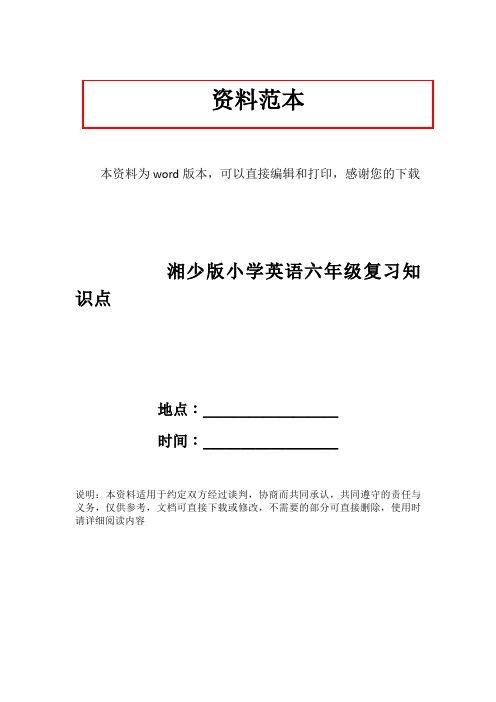
资料范本本资料为word版本,可以直接编辑和打印,感谢您的下载湘少版小学英语六年级复习知识点地点:__________________时间:__________________说明:本资料适用于约定双方经过谈判,协商而共同承认,共同遵守的责任与义务,仅供参考,文档可直接下载或修改,不需要的部分可直接删除,使用时请详细阅读内容湘少版(湖南少年儿童出版社出版)小学英语教材知识点,使用湘教版小学英语教材六年级的老师应该用得着,这些知识点还是很全面的,希望对您有所帮助。
1.字母:(大小)辨认、书写顺序;元音字母:A a , Ee, Ii, Oo, Uu2. 数字:1~999的基数词和序数词的运用,如计算、购物、时间、日期等。
句型:①What's your number?②What’s the time?③How many pens are there?④How old are you?⑤How much is it?⑥How tall are you?⑦How heavy are you?⑧What time do you get up?⑨When's your birthday?⑩What time did you see him?3. 颜色:单词:red, pink, yellow, brown, blue, purple, orange, black, white, green.句型:①What colour is it? ②What’s your favourite colour?4. 时间:年、季节、月、星期、日、时刻:Season( spring, summer, autumn, winter)Month: January, February, March, April, May, June, July, August, September, October, November, December.Week: Sunday, Monday, Tuesday, Wednesday, Thursday, Friday, Saturday.Day: 1st May (the first of May), May 2nd ( May the second)句型:见话题2。
湘少版本小学六年级的上册的英语总结复习重点.doc

WORD格式小学英语六年级(上)复习资料Unit 1 What did you do during the holidays?●词汇 :holiday 假期 during 在 ... 期间learn words and 学习单词和句playsentences 子gameslearn 学习写practise 练习听力writing 作listening你在假期都做些什么?speak 说玩游戏●语法 : 一般过去时:表示过去某个时间里发生的动作或状态过去时判断标志:句子中有表示过去的时间。
yesterday 昨天 yesterday morning昨天早上the day before yesterda last night前天昨晚last week 上周last month 上个last justyear 去年now刚才月two days ago 两天前 in 等, .1990+ 动词过去.构成:主语式动词过去式的变化规则:1. 直接加ed : work—worked look—looked2.以不发音 e 结尾的单词,直接加d:live lived hope---hoped---use--- used3. 以辅音字母+y结尾y 为 i加的,变ed:study—studied carry—carriedworry—worried+ed: stop — stopped 4. 以重读闭音节结尾且末尾只有一个辅音字母的,双写最后的辅音字母 plan — planned; 重读闭音节体现形式为辅- 元 - 辅结构,例如nod,n为辅音,o为元音,d为辅音。
5. 以 ic结尾的动词,要ic变成再加ed,如→ picnicked,把ick picnic traffic→ trafficked6.不规则变化的动词过去式:have- am/is- was are- ge--- g ot fe ---felt go---went drink----- had -- -- were t say--- said el do/does---did drank eat--ate broughbring---- tthink- thought bought caught taugh--- buy---- catch---- teach---- twear-- wore cut---- cut swept sleep —----slept see-- sweep sawsitbecome-- read-- ----- became -- read - sat●语言结构:What did you do during the holidays?专业资料整理WORD格式I read many books.I wrote a little storybook.◆乘坐某种交通工具“ by+交通工具的名称” 如:乘火车by train乘公共汽车by bus但是,有一个特殊,步行on footUnit 2 Katie always gets up early.凯蒂总是很早起床。
湘少版六年级上册英语复习核心知识

湘少版六年级上册英语复习核心知识本文档旨在为六年级上册英语研究提供核心知识的复指南。
以下是需要重点复的内容:Unit 1: Greetings- 问候语:Hello, Hi, Good morning, Good afternoon, Good evening, How are you?- 回应问候:I'm fine, thank you. And you?- 自我介绍:My name is... I'm from...- 人称代词:I, you, he, she, it, we, theyUnit 2: Classroom Objects- 文具:pen, pencil, book, eraser, ruler, crayon- 研究用品:desk, chair, blackboard- 询问物品:What's this? It's a...- 形容词:big, small, long, short- 数字:one, two, three, four, five, six, seven, eight, nine, tenUnit 3: My Family- 家庭成员:father, mother, brother, sister, grandfather, grandmother- 家庭关系:This is my.../These are my...- 形容词性物主代词:my, your, his, her, its, our, theirUnit 4: Daily Routine- 动词:get up, wash face, brush teeth, have breakfast, go to school, have lunch, go home, do homework, have dinner, go to bed- 副词:early, late- 一般现在时:I get up at...Unit 5: Food and Drinks- 食物:apple, banana, sandwich, pizza- 饮品:water, juice, milk- 询问喜好:Do you like...? Yes, I do. / No, I don't.- 表达喜好:I like... / I don't like...Unit 6: Weather- 天气:sunny, cloudy, rainy, windy, snowy- 问天气:How's the weather today? It's...- 回答天气:It's sunny/cloudy/rainy/windy/snowy.以上是六年级上册英语复的核心知识点。
湘少版六年级英语上册全册知识点汇总

湘少版六年级英语上册全册知识点汇总Unit 1一、核心词汇★★★1.动词: learn学习practise练习speak说2.名词: holiday假日;假期3.介词: during 在....期间二、了解词汇★★1.动词: ring响2.名词: bell铃3.疑问副词: why为什么三、核心句型★★★1. I read many books during the holidays.我在假期里读了很多书。
解读:此句是一个含有一般过去时的陈述句。
一般过去时表示过去某时发生的动作或状态,常和表示过去的时间状语连用。
举一反三: I visited my uncle. 我看望了我的叔叔。
I went to the park last Sunday. 我上周日去公园了。
2. - What did you do during the holidays? 你在假期里做了什么?- I learnt writing. 我学习写作了。
解读:问句是一般过去时的特殊疑问句。
答语为一般过去时的陈述句。
举一反三: - What did you do yesterday? 你昨天做什么了?- I played with my friends. 我和我的朋友们玩了。
3. Why didn't you run around the tree? 你为什么不绕着树跑?解读:此句是一个一般过去时的特殊疑问句,why为特殊疑问词,意为“为什么”,用于向对方询问原因,一般要用“Because ..”来回答。
举一反三: Why didn't you go out to play? 你为什么没有出去玩?四、了解句型★★1,The students are talking about their holidays.学生们正在讨论他们的假期。
解读:此句是一个现在进行时的陈述句。
现在进行时表示正在进行或发生的动作。
举一反三: He is watching TV.他正在看电视。
新湘少版六年级上册英语复习资料
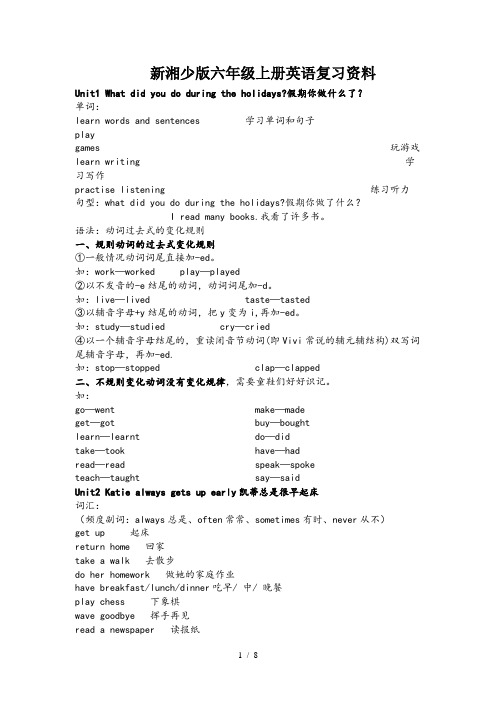
新湘少版六年级上册英语复习资料Unit1 What did you do during the holidays?假期你做什么了?单词:learn words and sentences 学习单词和句子playgames 玩游戏learn writing 学习写作practise listening 练习听力句型:what did you do during the holidays?假期你做了什么?I read many books.我看了许多书。
语法:动词过去式的变化规则一、规则动词的过去式变化规则①一般情况动词词尾直接加-ed。
如:work—worked play—played②以不发音的-e结尾的动词,动词词尾加-d。
如:live—lived taste—tasted③以辅音字母+y结尾的动词,把y变为i,再加-ed。
如:study—studied cry—cried④以一个辅音字母结尾的,重读闭音节动词(即Vivi常说的辅元辅结构)双写词尾辅音字母,再加-ed.如:stop—stopped clap—clapped二、不规则变化动词没有变化规律,需要童鞋们好好识记。
如:go—went make—madeget—got buy—boughtlearn—learnt do—didtake—took have—hadread—read speak—spoketeach—taught say—saidUnit2 Katie always gets up early凯蒂总是很早起床词汇:(频度副词:always总是、often常常、sometimes有时、never从不)get up 起床return home 回家take a walk 去散步do her homework 做她的家庭作业have breakfast/lunch/dinner吃早/ 中/ 晚餐play chess 下象棋wave goodbye 挥手再见read a newspaper 读报纸be late for school 上学迟到句型:Peter always gets up at 7:00 a.m。
湘少版英语六年级上册知识归纳【精校版】
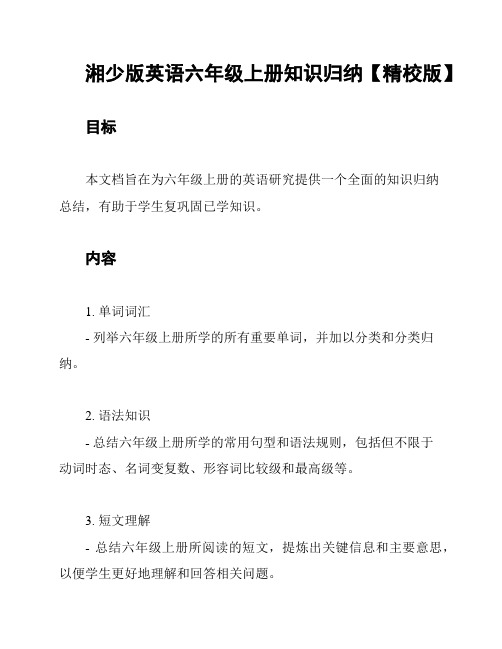
湘少版英语六年级上册知识归纳【精校版】目标
本文档旨在为六年级上册的英语研究提供一个全面的知识归纳
总结,有助于学生复巩固已学知识。
内容
1. 单词词汇
- 列举六年级上册所学的所有重要单词,并加以分类和分类归
纳。
2. 语法知识
- 总结六年级上册所学的常用句型和语法规则,包括但不限于
动词时态、名词变复数、形容词比较级和最高级等。
3. 短文理解
- 总结六年级上册所阅读的短文,提炼出关键信息和主要意思,以便学生更好地理解和回答相关问题。
4. 句子翻译
- 提供一些六年级上册中的句子,并要求学生将其翻译成中文,以加强他们的语言运用能力。
5. 课文要点
- 汇总六年级上册每个课文的要点和重点内容,帮助学生回顾
课文内容和理解教学重点。
使用方法
本文档可以作为学生在复阶段的指导资料,学生可以根据自己
的研究计划,有针对性地选择相应的部分进行复。
根据自己的优势
和需要,可以选择按照单词、语法、短文理解、句子翻译或课文要
点的顺序进行研究。
同时,建议学生结合教材和其他参考资料进行
综合复。
总结
通过本文档,六年级上册的英语学习者将能够更好地回顾和巩固已学知识,并在复习阶段更加有针对性地进行学习。
希望本文档能够对学生的学习有所帮助,提高他们的英语水平。
湘少版六年级上册英语语法完整版

湘少版六年级上册英语语法HEN system office room 【HEN16H-HENS2AHENS8Q8-HENH1688】背诵下面语法知识一、名词单数变复数的变化规则:1.一般情况直接加s2.以s,x, sh, ch结尾的加 es3.以o结尾的,表示“有生命”的事物加espotato-------potatoes 土豆 tomato------tomatoes 西红柿4.以o结尾的,表示“无生命”的事物加szoo------zoos 动物园 photo------photos 照片5.以辅音字母+y结尾的,先变y为i再加es;6..以f或fe结尾的名词,把f或fe变为v再加es.7.特殊变化的复数:man------men 男人 woman------women 女人child------children 孩子(们) mouse------mice 老鼠foot-------feet 脚 tooth------teeth 牙齿二、现在分词(动词ing)的变化规则1、一般情况下直接加ing,2、以一个不发音的e结尾的,先去e再加ing,take-----taking 拍(照), make-----making 制造,制作3、重读闭音节词,先双写最后一个字母再加ing,run------running 跑, swim------swimming, 游泳skip-----skipping 跳绳三、动词的第三人称单数的变化规则1、一般情况直接加s,2、以s, sh, ch, o 等字母结尾的加es,wash------washes 洗 go------goes 去3、以辅音字母加y结尾的,先把y改为i,再加es,4、特殊变化:have-----has 有,吃四、动词的过去式1.一般情况直接加ed,2.以不发音e结尾的只加d,3.以辅音字母加y结尾的,变y为i再加ed,4.重读闭音节词,先双写最后一个辅音字母,再加ed,5.特殊变化go---went is---was are---were have---hadtake---took eat---ate read---read cut---cutput---put do---did come---came feel----feltlearn---learnt speak---spoke teach---taught say---said run---ran swim---swam stand---stood sing--- sangwrite---wrote can---could see---saw bring---brought五、形容词比较级和最高级的变化规则1. 一般情况下在词尾加er或est;2. 以不发音字母e结尾的,只加r 或st;3. 重读闭音节词,先双写最后一个字母,再加er或est;4. 以辅音字母+y结尾的,先把y改为i,再加er 或est;5.多音节和部分双音节形容词,在这个词前加more表示比较级,在这个词前加most表示最高级。
湘少版英语六年级上册重点知识表 精选全文完整版

可编辑修改精选全文完整版湘少版英语六年级上册重点知识表Unit 1 What did you do during the holidays ?你在假期里做了什么?单词:during 在……期间 holiday 假日;假期 learn 学习practise 练习 speak 说短语:learn words and sentences 学习单词和句子play games 玩游戏 during the holidays 在假期里learn writing 学习写作 write a storybook 写一本故事书practise listening 练习听力 stand up 起立句型:——What did you do during the holidays?你在假期里做了什么? ——I read many books.我读了很多书。
I visited my grandparents.我去看望了我的爷爷奶奶。
I played games with my friends.我和朋友们一起玩了游戏。
补充:动词的过去式:talk-talked 谈论 practise-practised 练习 listen-listened 听 climb-climbed 爬 do-did 做 have-had 有 go-went 去learn-learnt 学习 take-took 拿 read-read 读 speak-spoke 说teach-taught 教 write-wrote 写 run-ran 跑Unit2 Katie always gets up early.凯蒂总是很早起床。
单词:always 总是 weekday 平日 often 常常;时常 after 在……之后 wave 挥手 return 返回 sometimes 有时 never 从不 短语:wave goodbye 挥手再见 take photos 拍照be late for school 上学迟到 draw pictures 画画do my/her/his homework 做作业 have breakfast 吃早餐read a newspaper 读报纸 after/before dinner 吃晚餐后/前 play chess 下棋 return home 回家take a walk 散步 help my parents 帮助父母 句型:Peter always get s up at 7:00 a.m.皮特总是早上七点起床。
湘少英语六年级上册知识归纳

湘少英语六年级上册知识归纳一般现在时和一般过去时的对比.一般现在时表示现在经常或惯性发生的动作或状态,其标志词是现在的时间,动词原形.一般过去时表示过去某个时间里发生的动作或存在的状态,其标志词是过去的时间,动词的过去式.1.What do you usually do on weekdays?你平时在工作日都做些什么?--I usually go to school and have classes./ I often play chess with my friends./ I sometimes take a walk after school./ I never read XXX.2.What did you do before you went to bed last night?昨晚睡觉前你做了什么?--I XXX my face./ I read a book for a while./ I watched TV with my family./ I XXX.一般现在时是用来表示经常、反复发生的动作或存在的状态。
通常会和XXX等时间状语连用。
主语为第三人称单数时,谓语动词需要加s或es,包括He、she、it以及单个名称。
例如,Katie always gets up early。
She often does her homework before dinner。
Sometimes。
XXX。
XXX.在Unit 3中,我们研究了一些单词和短语,如world、国家、email my friends、send greetings、search for a lot of things和find out about countries。
我们可以用这些词汇来构造句子,例如,I like my computer。
It is very fast。
What can we do onthe computer。
湘少版六年级上册英语复习重点

六年级英语复习总汇重点知识点:Unit 1 The children are playing in the park●词汇:swing 秋千slide滑梯bench长凳angry生气的bark狗叫chain链子bite咬stone石头cry哭●语法:现在进行时:表示现在正在进行的动作。
构成:am /is /are + 动词现在分词●语言结构:The children are playing in the park. 孩子正在公园玩。
Lingling is sitting on a swing.玲玲正在荡秋千。
An old man is sitting on a bench.. 一个老人正坐在长凳上。
Mingming is climbing up the slide. 明明正在爬滑梯。
Unit 2 Katie always gets up early.●词汇:get up起床 wash face 洗脸 make the bed 铺床 have breakfast 吃早餐wake up 醒来 always 总是,一直 usually 通常 often 经常,常常never 从不,从未,从来没有 late 迟的,晚的I’m late. 我迟到了.family 家庭 wave 挥手go to bed 上床睡觉●语法:一般现在时。
一般现在时:表示经常性习惯性动作.当主语是第三人称单数的时候,谓语动词也要用第三人称单数形式。
●语言结构:Katie always gets up early every day. Katie总是每天起得很早。
He usually waves them goodbye. 他总是挥手再见。
She always washed her face at 6:05 am.她总是在六点零五分洗脸。
英语中,表示在具体的某个时刻前,必须加介词“at” 如:在六点钟at six o’clockUnit 3 Let’s go to the Underwater World●词汇: picnic 野餐 library 图书馆 science story 科学故事go to the Underwater World 去海底世界 go to the library 去图书馆go to the park 去公园 talk about 讨论、谈论go to the shopping centre 去购物中心 go to the beach 去海滩●语法:由“Let’s+动词原形…”构成的祈使句。
湘少版版六年级上册英语全册教案(含单元知识点总结)

Unit 2 Katie always gets up early.Unit 5 It will be sunny and cool tomorrow.Period 1一、教学目标(一)语言目标1. 词汇:能听懂、会说、认读新单词forecast,clear,heavy,light,rain;能听懂、理解、会说新单词won’t;能在语境中复习与运用关于天气的旧单词sunny,rainy,cold,warm,cool,hot2. 句型:能理解、运用句型“It will∕ won′t be tomorrow.”描述不同天气;能理解、运用句型“There will ∕won′t be a”进一步描述不同天气(二)应用目标1. 能用英文指认将来的不同天气2. 能向同伴介绍将来的天气情况3. 能听懂、会说课文A部分的天气预报二、教学重、难点1. 重点:能听懂、会说、认读新单词forecast,clear,heavy,light,rain;能用句型“It will∕ won′t be, tomorrow.”与“There will ∕won′t be a,”对不同天气做出细致描述。
2. 难点:能运用名词rain,wind,snow等以及他们相对应的形容词rainy,windy,snowy等;能理解并学会运用“It will ∕won′t be,”与“There will ∕won′t be a,”三、教学准备单词卡片、教学挂图、教学磁带等四、教学过程Step 1 warm-up1. Greetings2. Sing a song: How is the weather? How is the weather? It is a fine day How is the weather? It is a cloudy day How is the weather? It is raining How is the weather? It is snowingStep 2 Presentation1. New words and new sentences(1) Brainstorming 教师出示核心单词weather,在weather四周出示不同天气的图片,帮助学生复习已学过的天气单词sunny,rainy,windy,snowy,cold,warm,cool,hot等(2) 情境创设:教师结合实际,为学生创设秋游的情境,在情境中学习并操练新单词weather forecast,clear,heavy,light,rain,won’t等师生讨论:提到秋游,孩子们首先考虑的是什么?T:good weather is very important。
(完整word版)湘少版六年级上册英语复习资料1-12(自己整理)

湘少版六年级上册英语复习资料Unit 1 What did you do during the holidays?三、读出下列句子,并写出它们的汉语意思。
1.描述过去发生的动作,动词要用过去式态。
(yesterday, during the holidays,last year,lastweek…)例如:A:What did you do during the holidays?B: I learnt writing.I read many books.I practiced listening.I played games。
2。
现在进行时:be动词(am,is ,are)+动词—ing例如:A: What are you reading?B:I’m reading an English storybook。
3。
a+辅音音素an+ 元音音素(Aa,Ee, Ii, Oo,Uu)in English 用英语例如:Anne wrote a storybook in English during the holidays.4.to+ 代词宾格(me, you, him, her,us,them)例如: Read it to us.Unit 2 Katie always gets up early。
三、读出下列句子,并写出它们的汉语意思。
在一般现在时中,当主语为第三人称单数时,动词要用第三人称单数形式.1.Katie always gets up early.2.Katie often does her homework before dinner。
3.Katie sometimes plays chess with her father after dinner。
4.Katie never takes a walk.5.on+ 天,at+时,in+月,季,年weekdays,she always gets up 6:30 a。
新湘少版六年级英语上册一到四单元知识点
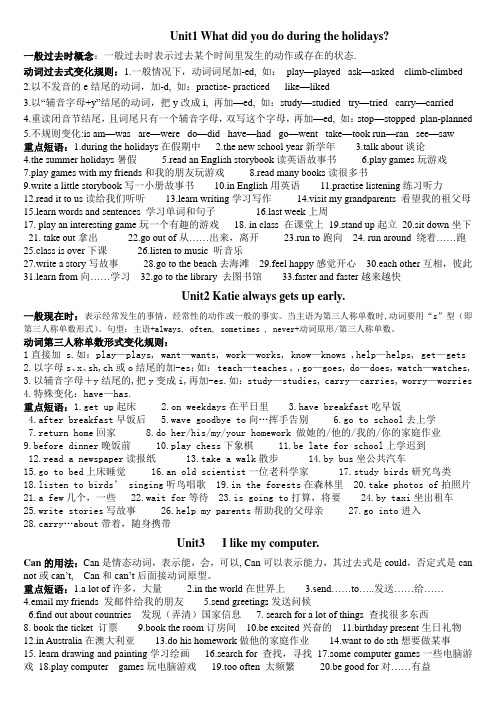
Unit1 What did you do during the holidays?一般过去时概念:一般过去时表示过去某个时间里发生的动作或存在的状态.动词过去式变化规则:1.一般情况下,动词词尾加-ed, 如:play—played ask—asked climb-climbed2.以不发音的e结尾的动词,加-d, 如:practise- practiced like—liked3.以“辅音字母+y”结尾的动词,把y改成i, 再加—ed, 如:study—studied try—tried carry—carried4.重读闭音节结尾,且词尾只有一个辅音字母,双写这个字母,再加—ed, 如:stop—stopped plan-planned5.不规则变化:is am—was are—were do—did have—had go—went take—took run—ran see—saw重点短语:1.during the holidays在假期中 2.the new school year新学年 3.talk about谈论4.the summer holidays暑假5.read an English storybook读英语故事书6.play games玩游戏7.play games with my friends和我的朋友玩游戏8.read many books读很多书9.write a little storybook写一小册故事书10.in English用英语11.practise listening练习听力12.read it to us读给我们听听13.learn writing学习写作14.visit my grandparents 看望我的祖父母15.learn words and sentences 学习单词和句子st week上周17. play an interesting game玩一个有趣的游戏18. in class 在课堂上19.stand up起立20.sit down坐下21. take out拿出22.go out of从……出来,离开23.run to跑向24. run around 绕着……跑25.class is over下课26.listen to music 听音乐27.write a story写故事28.go to the beach去海滩29.feel happy感觉开心30.each other互相,彼此31.learn from向……学习32.go to the library 去图书馆33.faster and faster越来越快Unit2 Katie always gets up early.一般现在时:表示经常发生的事情,经常性的动作或一般的事实。
湘少版六年级上册英语复习重点
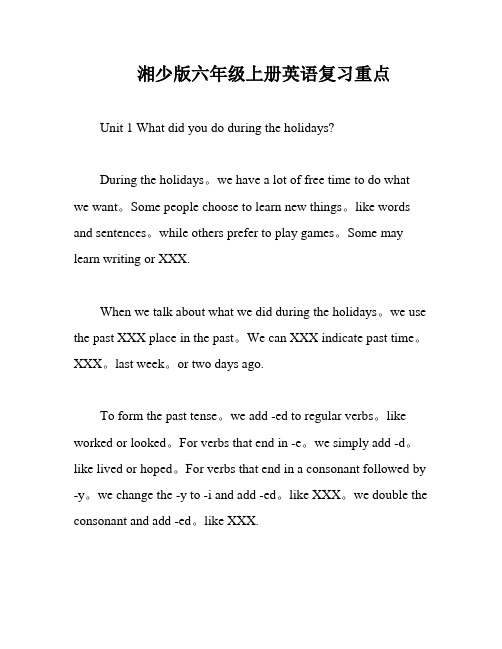
湘少版六年级上册英语复习重点Unit 1 What did you do during the holidays?During the holidays。
we have a lot of free time to do what we want。
Some people choose to learn new things。
like words and sentences。
while others prefer to play games。
Some may learn writing or XXX.When we talk about what we did during the holidays。
we use the past XXX place in the past。
We can XXX indicate past time。
XXX。
last week。
or two days ago.To form the past tense。
we add -ed to regular verbs。
like worked or looked。
For verbs that end in -e。
we simply add -d。
like lived or hoped。
For verbs that end in a consonant followed by -y。
we change the -y to -i and add -ed。
like XXX。
we double the consonant and add -ed。
like XXX.There are also irregular verbs that do not follow these rules。
Some examples include had。
was/were。
got。
said。
felt。
did。
went。
drank。
ate。
brought。
- 1、下载文档前请自行甄别文档内容的完整性,平台不提供额外的编辑、内容补充、找答案等附加服务。
- 2、"仅部分预览"的文档,不可在线预览部分如存在完整性等问题,可反馈申请退款(可完整预览的文档不适用该条件!)。
- 3、如文档侵犯您的权益,请联系客服反馈,我们会尽快为您处理(人工客服工作时间:9:00-18:30)。
湘少英语六年级上册知识归纳
Unit 1
★动词过去式变化规律:
1. 一般情况下,直接在动词词尾加ed. 如:tal—taled说listen—listened听
play—played玩climb—climbed爬
2. 以不发音的e结尾,在动词词尾加 d. 如:practise—practised练习
3. 以辅音字母加y结尾的动词,变y为i再加ed. 如:study—studied学习,研究
4. 以一个辅音字母结尾的重读闭音节词,双写最后一个辅音字母,再加ed. 如:stop—stopped停止
5. 不规则动词没有规律,需要特殊记。
如:do-did have—had go—went learn—learnt tae—too read —read spea—spoe
teach—taught stand—stood sit—sat say—said run—ran
is, am—was are—were write--wrote
★单词、短语
during 在…期间holiday 假期
learn words and sentences学习单词和句子play games玩游戏
learn writing学习写作practice listening练习听力
★句子
时态:一般过去时,表示过去某个时间里发生的动作或存在的状态。
主要有动词的过去式体现,其标志
词是过去的时间。
如:yesterday昨天last night昨晚last wee上周last year 去年等等。
1. What did you do during the holidays? 假期间你做了什么?
--I read many boos./ I learnt writing. / I wrote a little storyboo in English./ I visited my grandparents.
Unit 2
★单词、短语
weeday工作日after在…之后before在..之前
always总是,经常often时常sometimes有时never从不
wave goodbye挥手再见be late for school上学迟到read a newspaper读报纸
play chess下棋tae a wal散步get up起床have/has breafast吃早餐return home回家
★句子
时态:。
